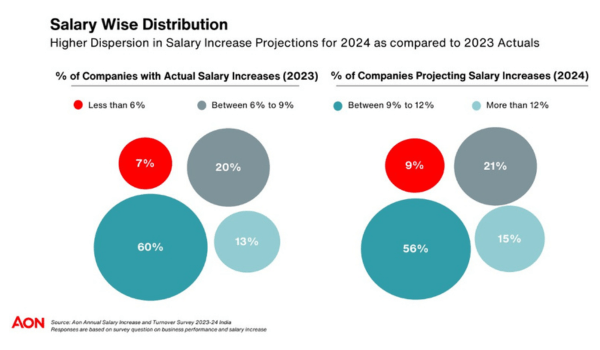Indian employees can expect a 9.5 per cent salary increase in 2024, according to Aon’s Annual Salary Increase and Turnover Survey. This figure, while slightly lower than the 9.7 per cent hike witnessed in 2023, still outshines other emerging markets like Indonesia, Malaysia, and China.
The report, based on data from over 1400 organisations across diverse sectors, paints a picture of cautious optimism. It signifies India’s economic resilience, inching closer to the pre-pandemic 10 per cent benchmark.
However, the survey reveals a nuanced picture beneath the national average. While manufacturing maintains stability at 9.7 per cent, driven by infrastructure investments, the services sector sees a slight dip to 9.4 per cent. This divergence highlights the varying influences impacting different industries.
Interestingly, the report also delves into company strategies. While some are offering smaller increases (less than 6 per cent) compared to last year, others are proposing substantial hikes exceeding 20 per cent. This suggests a calculated approach to talent retention amidst a competitive job market.
The good news is that attrition rates are declining, falling from 21.4 per cent in 2022 to 18.7 per cent in 2023. This stability allows organizations to focus on enhancing capabilities and productivity, creating a positive feedback loop.
Sector-wise analysis further reveals intriguing trends. Industries like FMCG, life sciences, and engineering, largely driven by domestic consumption and less susceptible to global headwinds, show stability or even growth in projected increases. Conversely, IT, professional services, and financial institutions face downward projections due to the looming global recession. Notably, non-banking financial companies (NBFCs) stand out with a higher projected increase, likely fuelled by domestic demand.
Interestingly, the survey also reveals a consistent trend where larger salary increases are directed towards junior and middle management compared to top and CEO positions. This suggests a focus on nurturing future leaders and talent pipelines.
Furthermore, companies are increasingly confident in reducing non-merit salary components, reflecting a shift from purely market-driven adjustments to more strategic compensation practices. Merit-based increases remain stable, hovering around 8.2 per cent.
In conclusion, Aon’s report paints a picture of steady growth with cautious optimism for India’s salary landscape in 2024. While the overall average dips slightly, a closer look reveals significant sectoral divergences and strategic adjustments by companies. As Jang Bahadur Singh, director, talent solutions, Aon India, aptly states, “Leaders are likely to shift towards building supportive work environments to foster employee engagement in this dynamic job market.” This shift, alongside strategic compensation practices, will be key to navigating the evolving economic landscape and attracting top talent in the coming year.


